Create long-term relationships with stakeholders and contribute to the upliftment of local communities
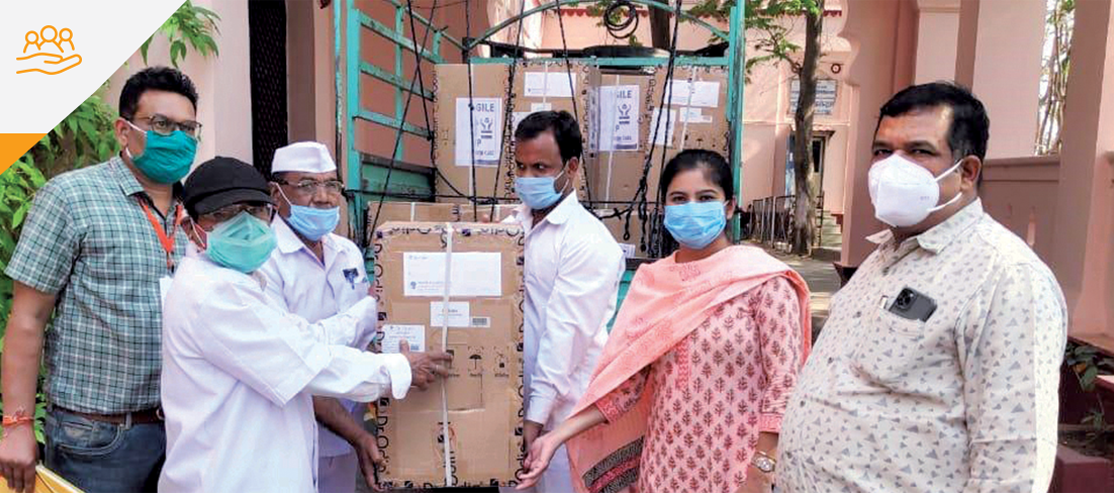
Key highlights
Total community investments
COVID-19 response expenditure
Total number of beneficiaries
COVID-19 response beneficiaries
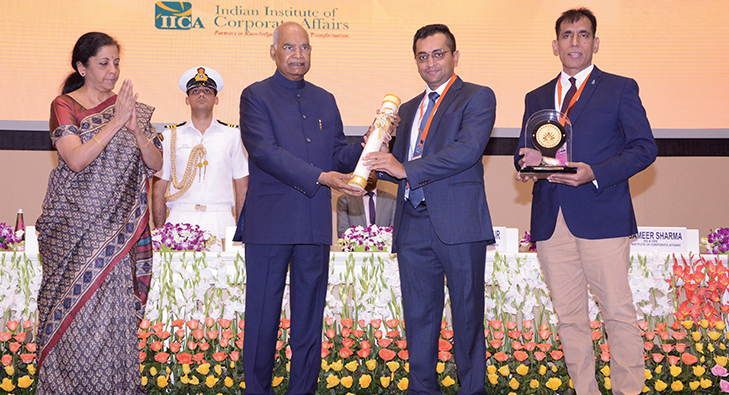
‘CSR in Challenging Circumstances – North India’.
SRF strives to maintain mutually respectful and beneficial relationships with its stakeholders, including customers, suppliers, and local communities that thrive in the vicinity of its plants. The Company puts relentless efforts to create a positive impact on local communities to empower them and contribute to the socio-economic upliftment of the society at large.
To create a meaningful impact in the lives of the communities, SRF places a firm belief on having a purpose intrinsic to the fabric of the society. The SRF Foundation spearheads all the CSR-related activities in India, running one of the largest community programs in and around SRF’s manufacturing plant locations as well as in other parts of the country.
SRF Foundation plays an active role in championing the cause of quality education, vocational skill development, promotion of art & culture, preventive healthcare and natural resource management. Need Assessment Survey is conducted to identify the key areas of intervention in the local communities. The Foundation also implements initiatives by collaborating with the Government, Corporates and NGOs. This helps in expanding the reach and addressing pressing issues in larger communities through effective mechanisms. After the implementation of the initiatives, Impact Assessment Study is conducted to assess the impact created on local communities. For instance, the SRF Foundation carried out impact assessment studies of Mewat Rural Education Program and Mewat Rural Vocational Program in association with International Management Institute to assess the impact of its efforts.
To ensure successful adoption and sustainability of the community development initiatives, SRF undertakes all its CSR activities in partnership with the local communities. The communities not only engage with the project planning and implementation phases, but also take full ownership of the projects. To ensure active community participation, SRF has also formed various community-based groups, such as School Management Committees, Village Development Committees, etc., to strengthen implementation of the projects.
CSR initiatives of the Company are focussed on disadvantaged, vulnerable and marginalized stakeholders from the local communities. The Company has a process in place to identify key intervention areas based on need assessment survey. SRF engages with them in partnership with the Government or the local communities through various Corporate Social Responsibility (CSR) and Affirmative Action Interventions.
In FY 2020-21, SRF spent nearly INR 10.18 Crores on various CSR activities, including education, Natural Resource Management (NRM), art & culture, etc. During the same period, SRF also spent INR 2.5 Crores as COVID-19 response expenditure. Beyond the CSR contributions, SRF also contributed INR 1.0 Crore towards the Madhya Pradesh CM Relief Fund to help mitigate the economic impact of the COVID-19 pandemic. Some of the key initiatives are highlighted below.
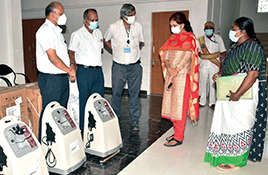
As the plight of people worsened due to the COVID-19 pandemic restrictions and the subsequent loss of livelihood, the SRF Foundation stepped in to protect the lives of people in the communities. It was ensured through effective distribution of grocery and food packets, masks, sanitizers, gloves and PPE kits to those in need. During the uncertain times, the SRF Foundation also extended its support to the local NGOs, government officials, local administration, healthcare workers, police personnel and other essential service providers. Apart from providing essential items, medical kits, temperature guns, ICU cots and meals distribution, financial assistance was provided to the communities, as well as to hospitals and government authorities. Nearly 100 employees of SRF have been involved throughout the implementation of the program.
Impact created: 23,775 beneficiaries across 8 locations in India
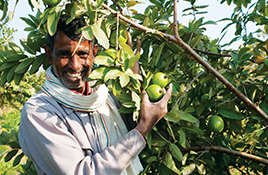
The NRM project continues to reach the marginalised sections of the society and improve their livelihood by adopting the watershed-based practices and environment conservation approach. Hydrological and Environment studies have been conducted in 35 villages around SRF Bhiwadi Plant in the Tijara block where rainfall is below normal. Based on the study, 206 earthen dams have been constructed till date for harvesting rainwater. The aim is to recharge groundwater equal to double the amount of extraction at the Bhiwadi Plant. The project also helped local farmers by levelling 1,850 hectares of privately-owned barren and gullied lands and planting 3.5 lakh Aruneem plants. 15 employees of SRF have been directly involved in the implementation of the project.
Impact created: 8,700 people | 35 villages, Alwar
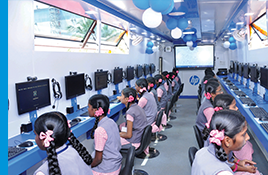
The Digital Education Program has a vision to transform India into a digitally empowered society and knowledge economy by imparting quality education and developing digital skills.
The project is implemented by SRF Foundation in collaboration with various government departments and functionaries such as State/District Education Departments, private, local and village institutions, panchayats, etc. The focus is on improving infrastructure and academic facilities and promoting digital-based learning.
Nearly 240 employees have been involved over the entire span of the project.
1,36,311 students, 2,161 teachers spread over 472 schools and 1,11,095 community members in 19 locations and across 9 states have benefitted from this program.
Impact created: 1.3 lakhs students; 2,161 teachers; 1.1 lakhs community members | 9 States
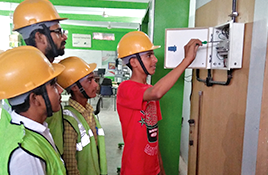
The SRF Foundation has initiated the Vocational Skills Program with the mantra of ‘Connect the Unconnected’ to provide economic security to the rural youth, by making both the skills and opportunities available to them.
The SRF Foundation works in a collaborative manner, wherein, it partners with every stakeholder that can or does play a significant role in imparting the necessary skills and develop employable youth to secure their livelihood.
Out of all the trainees trained since 2011, majority of them have secured placements and the rest of them have opened their own businesses.
The impact assessment of the program has been conducted twice and 60 employees of SRF have been involved in the implementation of the program since its inception.
Impact created: Nuh: 100 students every year since 2011; Gwalior and Gummidipoondi: 200 students every year since 2018 | 29 Villages
SRF undertakes various initiatives for nurturing relationship with its customers to secure the position of a trusted and long-term partner of choice. The values are built on the foundation of long-term, transparent and trust-based relationships through continuous engagement and innovation. Customer feedback is of immense importance for SRF. Thus, the Company seeks customer feedback through customer satisfaction surveys conducted in a periodic manner. Robust systems and resolution mechanisms are in place to ensure customer feedback is incorporated and corrective action is taken.
As on 31st March 2021, overall SRF had 7.85% of pending customer complaints for resolution.
SRF is cognizant of the criticality of providing adequate product information on all its products to ensure transparency with its customers. SRF largely manufactures intermediates and supplies to industrial customers. The Company provides the necessary information and instructions for use of its products, product grade, dimensions, gross weight and other necessary regulatory requirements, as applicable. Additionally, material facts sheet, safety instructions, precautions to be taken while handling the product, Hazard Class in case of hazardous materials, and any other specific information requested by the customer is also shared.
In addition, the Chemicals Business also labels the Zero ODS potential in their products, wherever required. Over and above the mandated state and national laws, the Chemicals Business also follows all applicable international rules and regulations, such as, Globally Harmonized System (GHS), Classification, Labelling and Packaging (CLP) notification, International Maritime Dangerous Goods (IMDG) Code, etc., while displaying information on product label.
Considering the growing demand of customers for environmentally and socially responsible products and the grave issue of climate change, SRF has been consciously driving its resources to develop sustainable products. The Company aims to manufacture products taking into consideration the social and environmental concerns, risks and opportunities. Some of the key products are highlighted below:
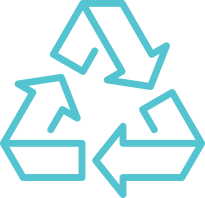
SRF procures all the key raw materials from reliable and sustainable sources by establishing strong relationship with suppliers and other business partners to ensure uninterrupted operations and business continuity. SRF has introduced digital interventions to combat supply chain disruptions and has put efforts to automate processes using the Business Process Management platforms. In some of the key segments, SRF also plans to integrate the customer and supplier portals to gain a good control on the key supply chain metrics. For the sourcing of critical raw materials, the Company has entered into long-term contracts with the vendors for continuous supply and formulae-driven price discovery agreements.
The Company firmly believes in fostering its supply chain with high standards of health and safety, human rights, business integrity and the environment protection, among other parameters. This not only generates value for the Company, but also helps in mitigating the inherent risks associated with its intricate supply chain. For instance, the Chemicals Business at SRF has a Code of Conduct in place that assesses the ESG aspects (Health and Safety, Human Rights, etc.) of their strategic suppliers. The Business carries out a periodic self-assessment of vendors and suppliers in accordance with the SA 8000 standard. In addition to this, SRF undertakes the supplier quality system assessment and development exercises on a periodic basis for its key suppliers by evaluating them on various parameters, such as, Resource Management, Planning of Product Realisation, Design and Development, Production, Compliance to Environmental requirements and Certifications, Customer Complaint Handling, Handling and Storage, etc. The Company follows a structured process, which includes gaps identification and establishment of corrective action plans to ensure gaps are corrected in a timely manner. Based on the outcome of the assessment, rating is also provided to key suppliers.
Sustainable sourcing of materials is a key focus area. SRF places reliance on local sourcing, wherever possible. Across SRF, 50-75% of key raw materials are sourced locally. As a constant endeavour to optimise natural resource management and continually improve on the environmental performance, During FY 2020-21, the Packaging Films Business consumed about 45 MT/month of PET flakes and Recycled PET Resin at its Kashipur plant. This share constituted nearly 8% of the total A-category raw material consumption of the plant on an annual average basis.